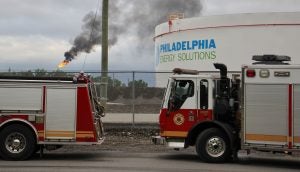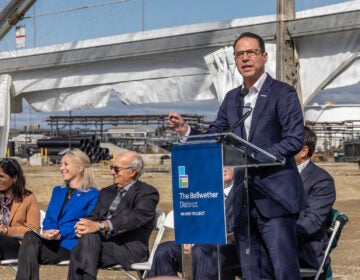Refinery’s closure sparks calls for a ‘just transition’ in Philadelphia
Philadelphia Energy Solutions’ future is unclear and the debate over what should happen to it mirror a conversation that’s taking place across the U.S.
Listen 5:10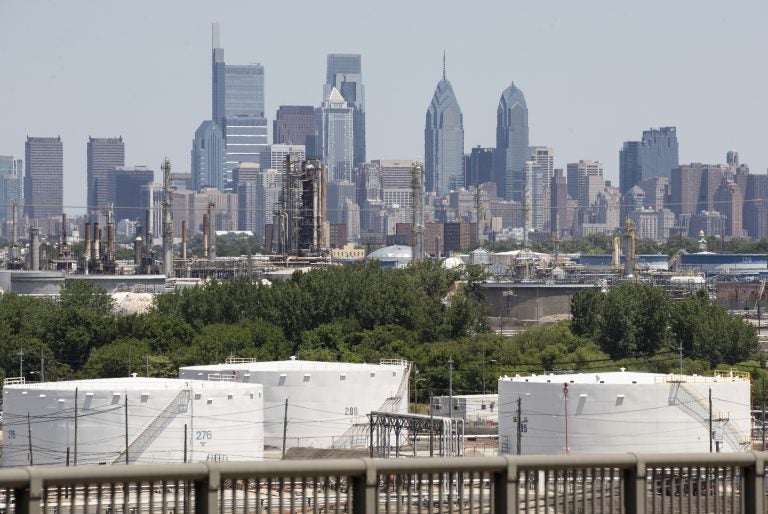
The Philadelphia Energy Solutions Refining Complex in Philadelphia is shown Wednesday, June 26, 2019. (AP Photo/Matt Rourke)
The Philadelphia Energy Solutions oil refinery just filed for bankruptcy again, the second time in less than two years, and is expected to stop processing crude oil this week. The company announced plans to close the refinery and lay off its more than 1,000 employees after an explosion and fire destroyed part of the facility last month.
News of the shutdown was painful to the refinery workers who, just days before, secured the facility and prevented the release of hydrogen fluoride, which could have been disastrous. Brandon Peters, a refinery operator at the company for 13 years said it became like a home to the people that worked there.
“I love working at that refinery. I love it. I’m heartbroken that it’s over,” he said.
Peters has two sons and said his family was probably going to have to change the way they live. He wants to stay in refining, but said there weren’t many opportunities locally. Peters’ union, United Steelworkers Local 10-1, wants to find a buyer to take over and restart the South Philadelphia refinery.
But residents who live near the 1,400-acre complex celebrated news of the shut down. Some have been speaking out for years about high rates of asthma and cancer in their neighborhood, which they attribute to pollution from the refinery.

“We don’t want it to just change hands and be an oil refinery again,” said South Philadelphia resident Shawmar Pitts. He wants to see the site become a hub for green energy.
Pitts is a member of Philly Thrive, an environmental justice group that has long opposed the refinery. The day the closure was announced, Philly Thrive posted a photo to the group’s Twitter account with the words: “VICTORY: The largest polluter in Philly is closing. Time for a Just Transition!”
The future for the site is unclear. But these two very different views toward what should happen to it mirror a conversation that’s taking place all over the country right now. How do we move toward a low-carbon future without displacing the more than one million people who make their living in fossil fuels?
Check out Thrive’s official statement on the closing of the PES Refinery: https://t.co/yNVYOddq0Y (Photo credit: Kimberly Paynter/WHYY) pic.twitter.com/PPp1hNcpMk
— Philly Thrive (@PhillyThrive) June 26, 2019
What a ‘just transition’ looks like
Advocates who say it’s possible endorse a concept called a “just transition.” Labor and environmental groups have adopted the phrase, as well as politicians such as U.S. Rep. Alexandria Ocasio-Cortez and U.S. Sen. Bernie Sanders. Joe Uehlein, president of the Labor Network for Sustainability, described it this way: “If society deems it a good thing to limit carbon pollution, it should not be on the backs of working people, who through no fault of their own, are losing their jobs. Or, should a community have to pay and carry that burden?”
In other words, Uehlein said, a just transition means “no worker or community left behind.”
Philadelphia Energy Solutions is not shutting down because of fossil fuel regulations, and its closure will not cut global carbon emissions. But Philly Thrive sees this moment as an opportunity to prove the city can move toward clean energy in a way that benefits the city, the community, and the workers. They see it as a test case for a just transition.
The group’s vision for a just transition, as described in letters to the mayor’s office and to City Council members, demands a transparent public process to determine the future use for the refinery site. After all, at 1,400 acres, the property is roughly the size of Center City. It also asks for PES to pay reparations to the surrounding neighborhood for pollution violations, and to “shore up pensions and transition plans for workers.”
The problem with renewables
Pitts, who is part of Philly Thrive’s “Green Economy for All” committee, said that putting clean energy on the site could potentially benefit the workers as well.
“We’re going to need people to do those jobs. Those people who lost their jobs, [we can] give them precedence and retraining,” Pitts said.
“If they want,” he added.
When the president of the United Steelworkers union Local 10-1, Ryan O’Callaghan, spoke to a group of legislators after the announcement of the closure, he quickly quashed this notion.
“The idea of retraining us for jobs that don’t exist is not the answer. The idea to put a solar panel farm on the site is not the answer. The answer is to restart the refinery now,” O’Callaghan said.
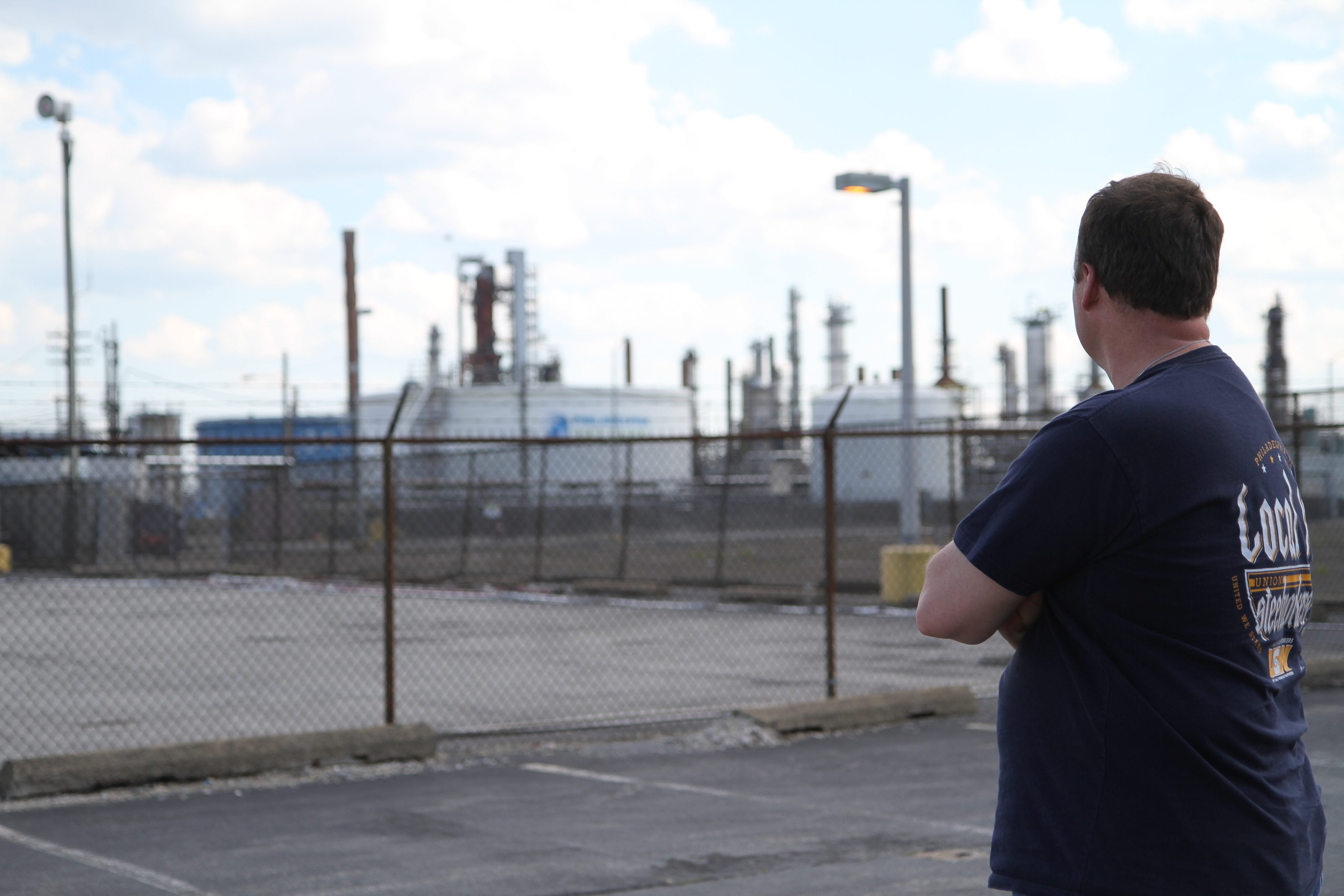
The site will require years of remediation before any kind of green energy infrastructure could be installed. The laid-off refinery workers need jobs now.
This idea that fossil fuel workers can be retrained to work in clean energy comes up frequently when people talk about a just transition. But Patrick Young, a former organizer for the United Steelworkers International Union in Pittsburgh, said the notion is misguided.
“Just because you’re an oil refinery worker right now doesn’t mean you need to work in another job in the energy sector,” Young said.
There are other problems with the idea. Refinery workers make between $70,000 and $120,000 per year, which is more than double what the average solar panel installer currently makes. Young said many refinery workers are in their 50s and nearing retirement. To them, “the idea that you’re going to learn a whole new skill and go into an industry that’s going to pay considerably less is pretty frustrating and not all that attractive.”
It’s possible this could change. Young said that the United Steelworkers union has ongoing efforts to organize labor in the solar industry. The primary reason refinery jobs pay so well is that the union engaged in decades of collective action and struggle to win better wages.
Roots in labor
The United Steelworkers union is not calling for a just transition in Philadelphia right now — they just want to see the refinery reopened. But the concept actually has roots in that very union.
It all started with a guy named Tony Mazzocchi, who was a leader of the Oil, Chemical, and Atomic Workers union, which later merged with the Steelworkers. In the 1990s, Mazzocchi saw the data on climate change and understood the world was going to have to move away from fossil fuels. He quickly realized the implications for the workforce, and dreamed up the idea of creating something like the Superfund program, but for workers. Superfund is a government program that establishes a fund to clean up sites contaminated with hazardous waste and try to force the responsible party to pay for it.
Mazzocchi felt that the people who worked with toxic materials in order to provide energy for the world deserved financial help to transition and start a new life. Superfund for Workers wasn’t a very attractive title, and eventually the name of his plan was changed to a “just transition.”
Setting an example
Young, who actually worked on the campaign to save the South Philadelphia refinery when it almost closed in 2011, took issue with viewing the current closure as a test case for the just transition. He said that a truly just transition requires planning.
“Ideally people have time and early warning to realize, ‘The refinery that I’m working in is closing, it’s closing in 4 years. And I can start making plans for what my life looks like in 5 years … 6 years … 7 years,’” Young said.
That’s not what happened in this case. Four days after the explosion, refinery workers heard on the news that they would lose their jobs.
Young is active with a climate justice group called Rising Tide North America, and he agrees with Philly Thrive’s demands for reparations, a public process, and even for a wholesale shift to clean energy. But he said that even if these things are achieved, calling what happened in Philadelphia a just transition would set a bad precedent.
“That’s just going to make everyone who works in the energy sector that much more terrified that like, okay, if this is a just transition, what the hell is an unjust transition?” said Young.
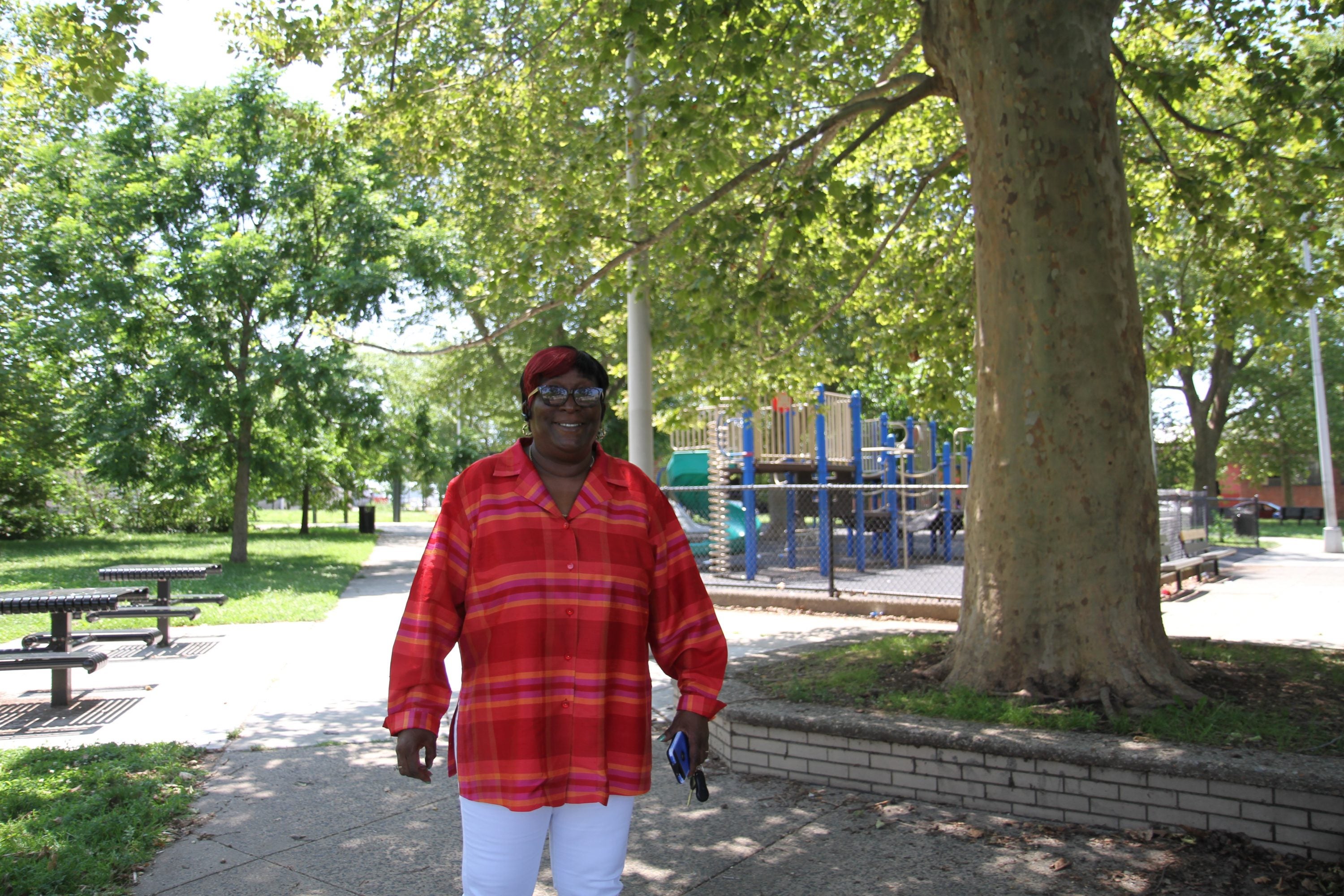
In the years since Mazzocchi first proposed a Superfund for workers, the concept of a just transition has taken on new meaning. Alexa Ross, one of the founders of Philly Thrive, said it’s not just about securing help for workers. She believes that the shift to renewable energy can be a driver for redistributing wealth and power in society.
For Ross and Pitts, the transition away from fossil fuels is urgent. Not just because of pollution, but because of climate change. Philadelphia is already experiencing more frequent, severe rainstorms and an increase in the number of dangerously hot days. Pitts acknowledged that there’s no win-win situation for the community and the workers right now, but he’s got a 6-week old daughter, and he’s thinking about her future.
“It’s not a thing where we don’t care about the workers. But we have to change. There’s no way we can go on like this. We won’t survive,” said Pitts.
The Philadelphia mayor’s office has formed a working group to determine next steps for the refinery site. More information about who is included in the group is expected to be released this week and they will hold their first public meeting later this month.
WHYY is your source for fact-based, in-depth journalism and information. As a nonprofit organization, we rely on financial support from readers like you. Please give today.


